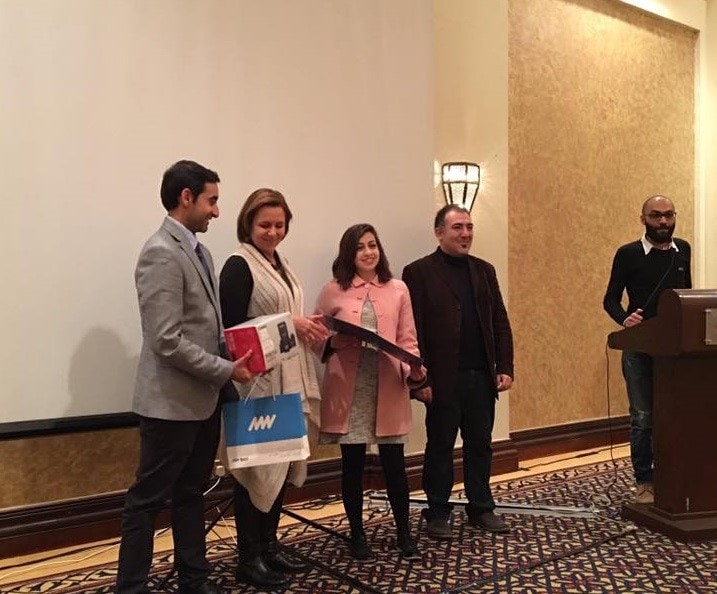By Dana Gibreel

From left to right: Mohammed Shamma, Rana Sabbagh , Dana Gibreel receiving her award, Naregh Galoustian, and Mohammed Ghbari
Last year, Journalists for Human Rights (JHR) announced its call for applications for human rights reporting awards. I was still working on a report about security raids in Jordan during the past three year. Ma’an governorate was the center of my focus due to the fact that it had witnessed the largest death rolls during those raids.
I’ve visited Ma’an, listened to its residents’ stories and felt that this report should be the one that represents me in any coming journalism competition. Although I was dedicated to many other causes, I still felt that this report should be the one or esle I’m not nominating myself.
This Year, when the organization announced their competition, I hesitated again; how will the jury discuss a report that many human rights activist have refused to give their opinions on due to its sensitivity? How capable is the jury, how dependent are they? I asked myself. However, I participated just to be part of the competition. I was convinced that both winning or losing the award does not mean losing the cause; and my report will remain a source of my pride.
In addition to my report, I submitted another report, just in case. The second report is about mental health in Jordan and the government’s impunity when it comes to homicides and suicides committed by those suffering from mental illnesses.
I was surprised when the awards were announced. My report “Death during Security Raids: an Excessive Force or Self-Defense?” came in first place, and the second place was awarded to my other report: “Mental Health in Jordan: What After suicide attempts?”
The security raids report poses the question of the right to ive; for the fugitives, security forces and the public in general and proceeds with questioning the government’s way of handling the cases of those who were considered to be very dangerous. We have lost so many lives from all sides. Do we believe that fair trials ensure security and more stability instead of proceeding with our approach of violence in which we all lose?
I don’t deny that winning has a special feeling on the personal level, especially because these two reports mean a lot to me. Moreover, I was more excited that my report on the neglected city of Ma’an has won. I remembered what some of Ma’an’s residents have told me when I was there. They described media as their enemy. They said that media has portrayed them as “monsters” and the city to be dangerous. Then, I needed a lot of time and a lot of trust from the residents to listen to their stories and understand them. Winning JHR’s award made me feel the success of media in communicating with a city where people are feeling so much marginalized.
What made me happier as well is the fact that this award had changed my misunderstanding of juries, competitions and awards. After the award’s announcement, I felt embarrassed. I understand now the main obstacles that we face is our self-censorship, our own fear of failure and others’ reactions, which might make us hesitant in moving forward with what we believe in and trust.
During the past weeks, Jordan has witnessed unusual events. A group of armed men has targeted security forces which led to the death of 7 officers and 3 civilians before the armed men were killed. 7iber, the media outlet I work for, covered the story immediately through a team that worked on explaining and clarifying the context to the public. That day, I received appreciation on the report that I’ve participated in preparing and heard congratulations as if I have received another award. I understood then that the public is entitled to know and the award is present in each new report that reveals information or creates controversy on an issue. The most important thing is the public’s participation in the events’ context and feeling that they have an opinion and an idea they would like to express. It’s of a significant importance that they have the space to do so, and to talk about issues. They might create pressure or mobilize afterwards.
Competing to win the award on the moral level means that many of us are capable now of covering stories based on rights. Stories that monitor governments in accordance with the legislations, treaties and international conventions that they violate without accountability. We have competed with a mindset of who will be able to put more effort in explaining the issue to the public and make it simple, by focusing on obtaining data on the issue and utilizing creative ideas in interpreting the data; in addition to understanding relevant legal aspects. Hence, when we’ve competed, the public have won more stories, information and an expanded space for freedom of speech.


